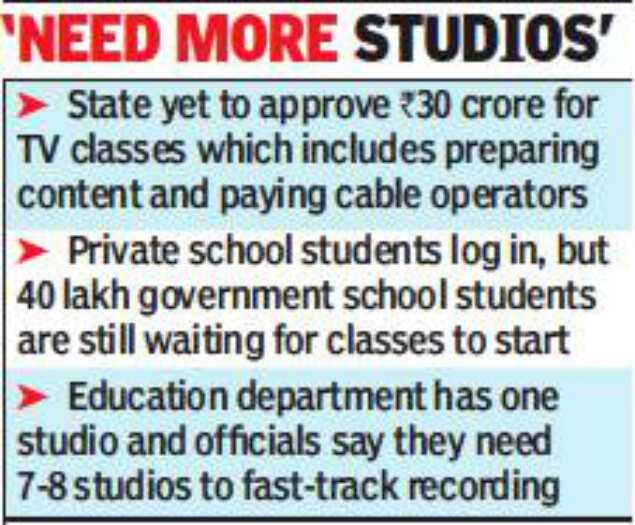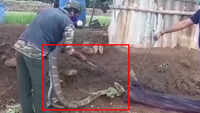
BENGALURU: With online education the only option yet in a pandemic-disrupted academic year, the Karnataka government is sitting on a Rs 30-crore proposal on classes-on-TV and about 40 lakh students of government schools are still waiting for classes to begin even in mid-July.

The state government has said classes on TV will start “in the next few days” for high school students. But the wait for lower grades is painfully long with lack of TV studios to record online classes and budget emerging as top constraints.
The expert committee that submitted its report last week on continuation of learning in school education had suggested TV as an important medium and it should be extended to all levels of schooling. A survey done by the department had shown 95% students have TV at home.
The Rs 30-crore budget includes preparing content and paying DTH and cable operators for beaming two education-only channels.
We are preparing content, but govt yet to grant nod: Official
We have sent the file, but the government is yet to give its approval. We are slowly preparing the content. We’ve 10 classes, six subjects and multiple mediums like English, Kannada and Marathi. It’s a huge task. It can happen only when the government approves,” said KG Jagadeesha, commissioner, department of primary instruction, adding they have written to the HRD ministry, seeking freeof-cost DTH channels. “If it approves, the cost will reduce,” he added.
The Department of State Educational Research and Training has only one studio, and the education department needs 7-8 studios to fasttrack recording. “We propose to start one studio in every District Institute of Education and Training and curate the content. Once the approval comes, we can start working and prepare content in 15-20 days,” he added.
Classes for grades 8-10 will be beamed on DD Chandana with four 30-minute sessions each in the morning and afternoon. Some 20 teachers are working on each subject. Four subjects are being prepared now in Kannada medium. Readying 30-minute content takes about four hours as it involves presentations, editing and rendering. “We’ve to submit classes to Doordarshan one week in advance. Renting a studio is costly since they charge Rs 10,000 per hour — not feasible. We can work round the clock at our studios. It’s difficult to start for other classes,” admitted DSERT director Maruti MR.
The panel had recommended other means of continuous learning like sending worksheets home.

The state government has said classes on TV will start “in the next few days” for high school students. But the wait for lower grades is painfully long with lack of TV studios to record online classes and budget emerging as top constraints.
The expert committee that submitted its report last week on continuation of learning in school education had suggested TV as an important medium and it should be extended to all levels of schooling. A survey done by the department had shown 95% students have TV at home.
The Rs 30-crore budget includes preparing content and paying DTH and cable operators for beaming two education-only channels.
We are preparing content, but govt yet to grant nod: Official
We have sent the file, but the government is yet to give its approval. We are slowly preparing the content. We’ve 10 classes, six subjects and multiple mediums like English, Kannada and Marathi. It’s a huge task. It can happen only when the government approves,” said KG Jagadeesha, commissioner, department of primary instruction, adding they have written to the HRD ministry, seeking freeof-cost DTH channels. “If it approves, the cost will reduce,” he added.
The Department of State Educational Research and Training has only one studio, and the education department needs 7-8 studios to fasttrack recording. “We propose to start one studio in every District Institute of Education and Training and curate the content. Once the approval comes, we can start working and prepare content in 15-20 days,” he added.
Classes for grades 8-10 will be beamed on DD Chandana with four 30-minute sessions each in the morning and afternoon. Some 20 teachers are working on each subject. Four subjects are being prepared now in Kannada medium. Readying 30-minute content takes about four hours as it involves presentations, editing and rendering. “We’ve to submit classes to Doordarshan one week in advance. Renting a studio is costly since they charge Rs 10,000 per hour — not feasible. We can work round the clock at our studios. It’s difficult to start for other classes,” admitted DSERT director Maruti MR.
The panel had recommended other means of continuous learning like sending worksheets home.

Coronavirus outbreak
Trending Topics
LATEST VIDEOS
More from TOI
Navbharat Times
Featured Today in Travel
Get the app









